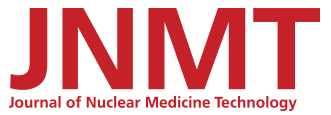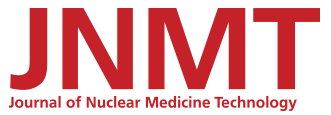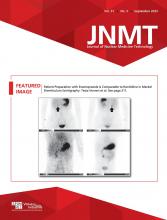Abstract
Prostate-specific membrane antigen (PSMA) expression has been observed in the neovasculature of various malignancies. We present a case of metastatic renal cell carcinoma (RCC) with comparative 18F-FDG PET/CT and 68Ga-PSMA-11 imaging in which FDG PET/CT failed to detect metastatic thyroid disease and showed less 18F-FDG–concentrating lesions at other sites, whereas 68Ga-PSMA-11 PET/CT identified metastatic thyroid disease and demonstrated intensely 68Ga-PSMA-11–expressing distant metastatic lesions. 68Ga-PSMA-11 PET/CT may be considered a potentially useful imaging technique in RCC to detect metastasis and to guide the choice of specific treatments, such as PSMA-based radionuclide therapy in patients with recurrent metastatic RCC.
- oncology
- 177Lu-PSMA-617 therapy
- 18F-FDG PET/CT
- 68Ga-PSMA-11 PET/CT
- clear cell carcinoma
- renal cell carcinoma
Prostate-specific membrane antigen (PSMA) is a type II transmembrane glycoprotein highly expressed in prostate cancer, with 68Ga-PSMA-11 PET/CT constituting an important molecular imaging modality in the management of patients. Overexpression of PSMA is not limited to prostate cancer only and has been also observed in the neovasculature of several nonprostatic tumors such as renal cell carcinoma (RCC), for which the role of radiolabeled PSMA for theranostic purposes is being explored (1,2).
CASE REPORT
Eight years previously, a 60-y-old man underwent left nephrectomy for a clear cell variant of RCC. He received sunitinib for metastatic lung disease 3 y previously and recently complained of left-sided chest pain and swelling of 2-mo duration. 18F-FDG PET/CT (Fig. 1) showed a soft-tissue mass having mild to moderate 18F-FDG avidity (SUVmax, 6.40) and measuring 10.1 × 6.3 × 9.5 cm in the left chest wall, as well as soft-tissue lesions in the mediastinum and bilateral nodules in the lungs. Five days after 18F-FDG PET, PET/CT with 68Ga-PSMA-11 (111 MBq [3 mCi]), after a 60-min postinjection period, showed an intensely 68Ga-PSMA-11–expressing left chest wall mass (SUVmax, 22.49), mediastinal lesions, and bilateral lung nodules. In addition, intensely 68Ga-PSMA-11–avid hypodense thyroid lesions were seen in fused coronal and transaxial images. Subsequently, fine-needle aspiration cytology showed the thyroid lesions to be metastasis from RCC.
Maximum-intensity-projection (MIP) image of 18F-FDG PET/CT (A) showed mildly 18F-FDG–avid soft-tissue mass (SUVmax, 6.40) measuring 10.1 × 6.3 × 9.5 cm in left chest wall, soft-tissue lesions in mediastinal region, and bilateral nodules in lung (dotted arrows in MIP images A and C). No abnormally increased 18F-FDG uptake was noted in fused coronal (B) or transaxial (E) images of neck region. 68Ga-PSMA PET/CT showed intensely 68Ga-PSMA–expressing left chest wall mass (SUVmax, 22.49; dotted arrow in C), mediastinal lesions, and bilateral nodules in lung (C). Additionally, intensely 68Ga-PSMA–avid hypodense thyroid lesions were seen in fused coronal (D) and transaxial (F) images (solid arrows in D and F, and MIP images A and C).
DISCUSSION
RCC is a highly aggressive, lethal cancer with a tendency toward distant metastatic spread. The notable features of RCC are late recurrence and distant metastases after initial diagnosis. Metastatic spread of RCC to the head and neck region is less frequent. Of this uncommon metastatic spread, the thyroid is the most commonly involved organ (2,3). The clinical utility of 18F-FDG PET/CT for evaluation of recurrent RCC is doubtful because of the variable glucose metabolism and biologic characteristics of RCC. PSMA is overexpressed in the neovasculature of RCC, particularly in clear cell subtypes, leading to clinical use of 68Ga-PSMA-11 PET/CT for detection of distant metastases (4). In a recent report, concordant 18F-FDG and PSMA uptake in metastatic lesions was seen in most cases of RCC, but a limited number of cases showed discordant uptake, favoring PSMA uptake in metastatic lesions (4). However, concrete evidence with prospective studies to support this finding is lacking. 68Ga-PSMA-11 PET/CT imaging has shown several advantages for evaluation of RCC patients (5–7), such as higher PSMA uptake than 18F-FDG uptake in lesions, leading to a high lesion detection rate; a future possible role in therapeutic response assessment for various therapies, such as antiangiogenic agents, immune checkpoint inhibitors, and stereotactic radiation; and future potential in theranostics in PSMA-positive lesions (imaging with PSMA PET/CT and treatment with PSMA labeled with β-emitting [177Lu or 90Y] or α-emitting [225Ac] radionuclides). In the present case, 68Ga-PSMA-11 uptake was higher than 18F-FDG uptake in all metastatic lesions, and there was discordant positive uptake for the metastatic thyroid lesion. Knowledge of this possibility may be helpful for management and future treatment planning in RCC.
CONCLUSION
68Ga-PSMA-11 PET/CT may be considered a potentially useful imaging technique in RCC to detect metastasis and to guide the choice of specific treatments, such as PSMA-based radionuclide therapy in patients with recurrent metastatic RCC.
DISCLOSURE
No potential conflict of interest relevant to this article was reported.
Footnotes
Published online Aug. 30, 2022.
REFERENCES
- Received for publication February 11, 2022.
- Revision received August 19, 2022.








